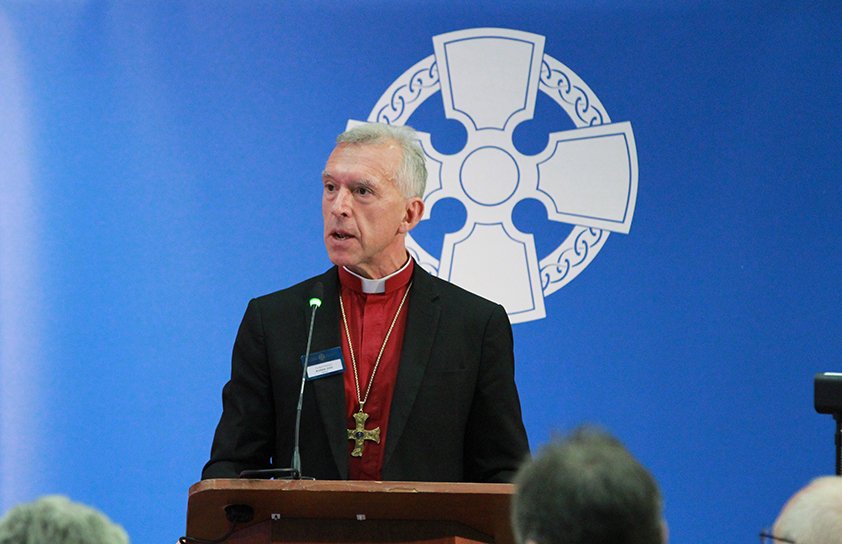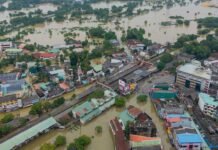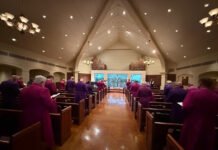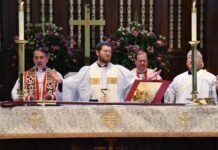Governing Body, September 4 2024
The Summer Olympics in Paris are now well behind us, but for the devotees they did showcase the very best in world sport and once again shone a spotlight on the extraordinary efforts of athletes across the world.
I think of those who had little financial support and have lived in the shadow of conflict: Cindy Ngamba, a Cameroonian boxer who represented the Refugee Olympic Team and was the first-ever medallist from this new constituency. Or Mohammad Amin Alsalami who fled war-torn Aleppo crossing the Mediterranean on a rubber boat to Greece, and then by foot to Germany. Like millions of other migrants, he was in search of a place where he could build a future without bombs and violence. He too, in the long jump, was a representative of the Refugee Olympic Team.
Each of the refugees have spoken of their gratitude that others helped them and made their journeys possible. Stories like theirs are a reminder that engagement across the divides, notwithstanding some real and important political challenges, can bring us closer together. The African proverb became a kind of motto for the Games: “If you want to go fast, go alone. If you want to go far, go together.”
As a church, facing very different kinds of challenges and opportunities, we have come to see something similar. In this Governing Body, it is a delight to welcome Bishop Anthony Poggo who is the Secretary General of the Anglican Communion, and we look forward to hearing him address the Governing Body directly, as well as preaching later in our gathering. Our relationship with the Anglican Communion is just one example where this motto is important: better, together.
Our world is also fragile. And the things which help us build together can never be taken for granted. So, my address this Autumn will focus attention on why togetherness is vital and why acts of co-discerning, co-conferring and co-creating are critical disciplines.
And I want to begin with some words from 1 Kings 19: 9b-15a:
Then the word of the LORD came to him, saying, “What are you doing here, Elijah?”
He answered,
“I have been very zealous for the LORD, the God of hosts; for the Israelites have forsaken your covenant, thrown down your altars, and killed your prophets with the sword. I alone am left, and they are seeking my life, to take it away.”
He said,
“Go out and stand on the mountain before the LORD, for the LORD is about to pass by.”
Now there was a great wind, so strong that it was splitting mountains and breaking rocks in pieces before the LORD, but the LORD was not in the wind; and after the wind an earthquake, but the LORD was not in the earthquake; and after the earthquake a fire, but the LORD was not in the fire; and after the fire a sound of sheer silence. When Elijah heard it, he wrapped his face in his mantle and went out and stood at the entrance of the cave.
Then there came a voice to him that said, “What are you doing here, Elijah?”
He answered,
“I have been very zealous for the LORD, the God of hosts; for the Israelites have forsaken your covenant, thrown down your altars, and killed your prophets with the sword. I alone am left, and they are seeking my life, to take it away.”
Then the LORD said to him, “Go, return on your way”.
We know this passage well. And usually find good connections in the coming of God to a beleaguered prophet, all too aware of the encircling enemies, challenges and paucity of resources. But the Lord was not in the earthquake, wind or fire. Two verses (9 and 13) almost identical in their wording: ‘And the word of the Lord came to him: ‘What are you doing here, Elijah?’ and again ‘Then a voice said to him, ‘What are you doing here, Elijah?’
Later this year we will gather from across the dioceses to pray, listen and learn. The Learning Community is not a gimmick to make us feel good about being active nor to wallow in the challenges we face. It is to enable us to reflect and then embed.
Like Elijah, we will pray for the wisdom to answer the same question: ‘What are you doing?’
The context for our gathering is the significant move made in all the dioceses to configure our life within Ministry Areas. This shift has not been at the level of governance only but has asked ministry and mission to be offered differently. To focus on sharing resources and a common commitment to a distinct area, to build teams which include the gifts of all God’s people, to look outwards because God loved the WORLD so much and to be joyful bearers of good news for one another in worship and fellowship.
We have not needed to do church differently in the way we must now. We have come to see how much we need the diverse ministries that reflect the charisms God gives us. We have seen new appointments that enhance and add to the cherished leadership of Ministry Area clergy. God is building a church which will be quite different from the one into which we were baptised. But it is a church which is better placed and shaped more creatively to reach out in loving service and in Christ Jesus. I want to give you one example of this and, forgive me, from my own diocese although I could add to this from other dioceses too. Jill Ireland is our first Outdoor Chaplain in Bro Eryri right beneath Yr Wyddfa. Jill’s role is to connect with the thousands who came here but, 95% of whom, have no connection with the church at all. Jill ministers in her own words to ‘love, relate, create’. Her task is all about ‘listening, learning, connecting and engaging for new relationships so that we can know people’s hearts and discover how God might already be at work and how we can join in.’
Ministry like this teaches us to learn the language of our communities and asks whether we can ‘stay in that place of trust and surrender. God has work for us to do and will reveal it. This blend of distinctive pioneering work alongside our commitment to Ministry Areas provides a new and exciting way of seeing our tasks as a church. Better, together.
It will be essential that the learning from this gathering is shared across the church. Timothy Radcliffe, the Dominican priest invited to lead the retreat for the Roman Catholic Church during their Synod on Synodality last year, has written: ‘If we listen to the Lord and to each other, seeking to understand his will for the church and the world, we shall be united in a hope that transcends our disagreements and be touched by that ‘Beauty so ancient and so new.’
What makes the picture hopeful is the way the churches have seen the significance of the Church Growth Fund initiative. Careful but ambitious bids show a church that remains hopeful and energised in the task of sharing good news. And there are some emerging patterns and themes we ought to notice.
Firstly, that the bids are (and need to be) incarnational. They need to rise up from within the vision, life and story of what God is doing in the dioceses rather than be fitful bursts of energy which bear no relation to any direction of travel being set.
Secondly, they need the underpinning of governance arrangements that ensure delivery and accountability. Throwing money at projects will not bring people to Christ necessarily: God does this! But we can invest well in those with the gifts and heart to make Christ known.
And lastly, they ought to challenge and extend us. We ought to feel the discomfort of a church that is trying new things and breaking new ground. I doubt for a second Elijah felt comfortable with the way God asked him to go into the wild places and become dependent upon ravens for food. But that was the way in which blessing came and lives transformed.
We have always been at our best when we are courageous and together.
Better, together.
I want now to say more about the environmental Summit the Church in Wales is sponsoring in November which brings over 70 delegates together from across the UK to confer on ways in which we might ‘Restoring Welsh Rivers’. We have amassed one of the largest gatherings of its kind meeting in November this year after 18 months of preparation. The summit involves academics, environmentalists, representatives from the farming community, the Church in Wales, water industry and other interested groups to confer on the ways in which the quality of water in Wales might be improved.
This is a complex matter and there are competing demands which will require strong engagement and clear articulation if conversation is to both shape public opinion and become policy or ambition in the political realm. Our intention is to create agreement about the principles and direction of travel required and commit to ongoing conversation where, complete agreement is not possible.
I found it intriguing when we found ourselves challenged about why the church was involving itself in something like this. Sometimes the result of ignorance, sometimes because secular thinking doesn’t like us ‘interfering’ in matters which don’t involve us and sometimes because we have not articulated a mission approach towards the environment which has been radical enough and lies at the heart of the gospel. We don’t just sing hymns on Sunday!
A church which is truly radical in its engagement with the world will address critical issues whether climate change, A.I, poverty or war. The summit will also invite new church action too: resources to help communities care for their environment, ideas about engaging locally with projects, schemes like ‘Adopt a River’ so that we, the Church in Wales, can show we are committed to our world.
But, of course, it’s better, together.
I mentioned the visit of Bishop Anthony Poggo at the beginning of my address and I want to say a word about the Anglican Communion. Our attention is usually taken up with disagreements relating to issues on human sexuality, especially that of same sex relationships. These are indeed important matters and affect how we do theology – how we read Scripture, understand tradition and the place of reason. But we can only do this together and as one body. When Jesus prayed the church might be one, he did not offer this as a kind of aspiration, an ambition towards which we might move and journey. He prayed it because it is of the essence of the church. In the words of the epistle to the Ephesian Christians there is ‘one Lord, one faith, one baptism; one God and Father of all, who is over all and through all and in all’. (Ephesians 4:5-6)
In other words, his prayer was that we might inhabit the truth, reality and constantly discover the joy of being one body. So, we cannot walk away from each other, assert we are not in communion with all our brothers and sisters in Christ. He has determined we are! What must characterize our life is a deep commitment to each other, in prayer, engagement and in mission. Eventually there will be some kind of outcome (though perhaps not resolution) to the dreadful situation in Gaza. What will we do as a Communion to help restore life, peace and hope there? It is my experience that when mission, bearing witness to the justice and love of God becomes our focus, we learn that communion is nothing other than belonging to each other in Jesus and doing his work. And for our part in the Church in Wales, we must stand ready. But we would do well to do it better, together.
I began with Elijah and 1 Kings 19. Chased by enemies, hungry and beleaguered, his plaintive recitation of faithful service is so human and vivid. But when God meets him at the entrance to the cave and twice asks him about his plan, something unexpected happens. God sends him back; to do exactly as he had been doing. No new mandate, no new deviation. But now the prophet is different. Now he has met with God, addressed by God, been compelled to reflect on the question asked: ‘What are you doing?’. Reorientated and rejuvenated Elijah responds.
Sisters and brothers, the question stands: ‘What are you doing?’ Like him, will you heed His voice and go to it? Together, better and with joyful confidence, attend to the work of God to make Christ known?
The answer is, of course, Amen.
The Lord be with you.
+Andrew Cambrensis



